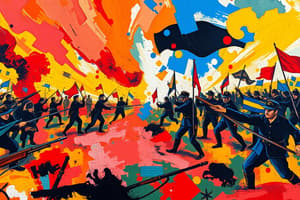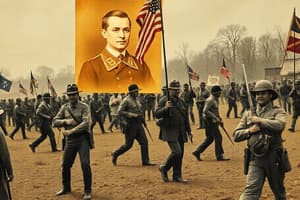Podcast
Questions and Answers
This was a battle that took place in Tennessee and shattered any remaining illusions either side had about the glory of war.
This was a battle that took place in Tennessee and shattered any remaining illusions either side had about the glory of war.
- Battle of Antietam
- Battle of Bull Run
- Battle of Fort Donelson
- Battle of Shiloh
- None of these answer choices (correct)
What were the causes of the Civil War?
What were the causes of the Civil War?
- Intolerance, abolition, politics
- Abolition, slavery, isolationism
- Tariffs (taxes), slavery, nationalism, election of Grant
- Tariffs (taxes), slavery, sectionalism, election of Lincoln (correct)
What was the first state to secede from the Union?
What was the first state to secede from the Union?
South Carolina
What was the first major battle of the Civil War?
What was the first major battle of the Civil War?
What battle became known as the bloodiest day of the Civil War?
What battle became known as the bloodiest day of the Civil War?
The first time in history that troops were moved by train was for which battle?
The first time in history that troops were moved by train was for which battle?
Fighting in Arkansas, Louisiana, Mississippi, and Tennessee became known as the 'War in the ___________'.
Fighting in Arkansas, Louisiana, Mississippi, and Tennessee became known as the 'War in the ___________'.
What battle was fought at Pittsburg Landing to gain control of an important railroad center near the Tennessee-Mississippi border?
What battle was fought at Pittsburg Landing to gain control of an important railroad center near the Tennessee-Mississippi border?
What were the three main objectives of the Union's war strategy?
What were the three main objectives of the Union's war strategy?
Why did the North make controlling the Mississippi River a war goal?
Why did the North make controlling the Mississippi River a war goal?
As the Civil War began, the South planned a(n):
As the Civil War began, the South planned a(n):
Why was the battle between the Monitor and the Merrimack historically important?
Why was the battle between the Monitor and the Merrimack historically important?
In 1863, Lee marched to Gettysburg with the goal of:
In 1863, Lee marched to Gettysburg with the goal of:
Who was the Union general who waged a 'total war' and led some 62,000 troops on a march to the sea to capture Savannah, Georgia?
Who was the Union general who waged a 'total war' and led some 62,000 troops on a march to the sea to capture Savannah, Georgia?
What were two leading causes of death during the Civil War?
What were two leading causes of death during the Civil War?
What freed the slaves in all rebelling states?
What freed the slaves in all rebelling states?
Why did Lincoln decide to issue the Emancipation Proclamation?
Why did Lincoln decide to issue the Emancipation Proclamation?
Who was the Union general who secured the interior of the Mississippi River with the Battle of Vicksburg?
Who was the Union general who secured the interior of the Mississippi River with the Battle of Vicksburg?
Who was an Admiral in the Union's Navy and secured Mobile Bay?
Who was an Admiral in the Union's Navy and secured Mobile Bay?
In what speech did Lincoln dedicate a battlefield in honor of the Union troops?
In what speech did Lincoln dedicate a battlefield in honor of the Union troops?
By issuing the Emancipation Proclamation, President Abraham Lincoln:
By issuing the Emancipation Proclamation, President Abraham Lincoln:
Who created the Red Cross?
Who created the Red Cross?
What were the Democrats remaining in Congress who protested the war known as?
What were the Democrats remaining in Congress who protested the war known as?
Which of the following was NOT an effect of the Emancipation Proclamation?
Which of the following was NOT an effect of the Emancipation Proclamation?
When was the Emancipation Proclamation issued?
When was the Emancipation Proclamation issued?
Why did President Lincoln believe the Copperheads were a threat to the Union war effort?
Why did President Lincoln believe the Copperheads were a threat to the Union war effort?
Give two examples of emergency wartime measures used by Lincoln.
Give two examples of emergency wartime measures used by Lincoln.
Describe the impact of the Emancipation Proclamation.
Describe the impact of the Emancipation Proclamation.
What was significant about the 54th Massachusetts Regiment?
What was significant about the 54th Massachusetts Regiment?
At which battle did Robert E. Lee lose his most important general, Stonewall Jackson?
At which battle did Robert E. Lee lose his most important general, Stonewall Jackson?
What three-day battle changed the tide of the war against the South?
What three-day battle changed the tide of the war against the South?
Approximately how many people died in the Civil War?
Approximately how many people died in the Civil War?
Where was the treaty for the end of the war signed?
Where was the treaty for the end of the war signed?
What was the military campaign by William Tecumseh Sherman known as?
What was the military campaign by William Tecumseh Sherman known as?
Who surrendered to Grant at Appomattox Court House?
Who surrendered to Grant at Appomattox Court House?
What does 'Habeas Corpus' mean?
What does 'Habeas Corpus' mean?
Who was the assassin of Abraham Lincoln?
Who was the assassin of Abraham Lincoln?
What were the results of the Civil War?
What were the results of the Civil War?
Flashcards are hidden until you start studying
Study Notes
Civil War Key Facts
- The Battle of Shiloh, fought in Tennessee, highlighted the brutal realities of war, dispelling myths of its glory.
- Major causes of the Civil War included tariffs, slavery, sectionalism, and the election of Lincoln.
- South Carolina was the first state to secede from the Union.
- The First Battle of Bull Run marked the first major conflict of the Civil War.
- Antietam holds the title of the bloodiest single day in the Civil War.
- Troops were transported by train for the first time during the First Battle of Bull Run.
- Fighting in Arkansas, Louisiana, Mississippi, and Tennessee is referred to as the "War in the West."
- The Battle of Shiloh occurred at Pittsburg Landing, crucial for controlling a railroad hub.
- The Union's war strategy included a blockade, capturing Richmond, and controlling the Mississippi River.
- Controlling the Mississippi River was vital as it bisected the Confederacy, weakening their control.
- The South adopted a defensive strategy focused on attrition during the war.
- The battle between the Monitor and the Merrimack represented a significant technological advancement in naval warfare.
- Lee's march to Gettysburg aimed for a decisive victory on Union territory.
- William Sherman led a "total war" strategy, marching 62,000 troops to capture Savannah, Georgia.
- Infection and disease were leading causes of death during the Civil War.
- The Emancipation Proclamation declared freedom for slaves in rebellious states.
- Lincoln issued the Emancipation Proclamation to use slavery as a strategy to win the war.
- Ulysses S. Grant secured the Mississippi River during the Battle of Vicksburg.
- Admiral David Farragut was instrumental in sealing the Gulf Coast from Confederate supply lines by securing Mobile Bay.
- The Gettysburg Address dedicated a battlefield to Union troops, emphasizing national unity.
- The Emancipation Proclamation broadened the Union's goals, aiming to end slavery.
- Clara Barton, a prominent female activist, founded the Red Cross.
- "Copperheads" were Democrats in Congress opposing the war.
- The Emancipation Proclamation did not abolish slavery immediately throughout all states.
- The Emancipation Proclamation was officially issued in 1863.
- Lincoln viewed Copperheads as a threat due to their potential to divide loyalties and discourage enlistment.
- Examples of Lincoln's emergency wartime measures included martial law and the suspension of habeas corpus.
- The Emancipation Proclamation laid the groundwork for future freedom for enslaved people.
- The 54th Massachusetts Regiment was notable for being composed entirely of black enlisted men, with Sgt. William Carney earning the Medal of Honor.
- Robert E. Lee lost Stonewall Jackson at the Battle of Chancellorsville.
- The Battle of Gettysburg was a pivotal three-day conflict that shifted the war's momentum against the South.
- Approximately 620,000 soldiers lost their lives during the Civil War.
- The war ended with the signing of the treaty at Appomattox Courthouse.
- Sherman's "March to the Sea" exemplified the concept of total war, aimed at demonstrating the harsh realities of conflict.
- General Robert E. Lee surrendered to Ulysses S. Grant at Appomattox Court House, marking the end of the war.
- Habeas Corpus guarantees due process rights, suspended by Lincoln during wartime.
- John Wilkes Booth assassinated President Abraham Lincoln.
- Results of the Civil War included over 600,000 deaths, extensive damages primarily in the South, preservation of the Union, affirmation of federalism, and the eventual abolition of slavery through the 13th Amendment.
Studying That Suits You
Use AI to generate personalized quizzes and flashcards to suit your learning preferences.




